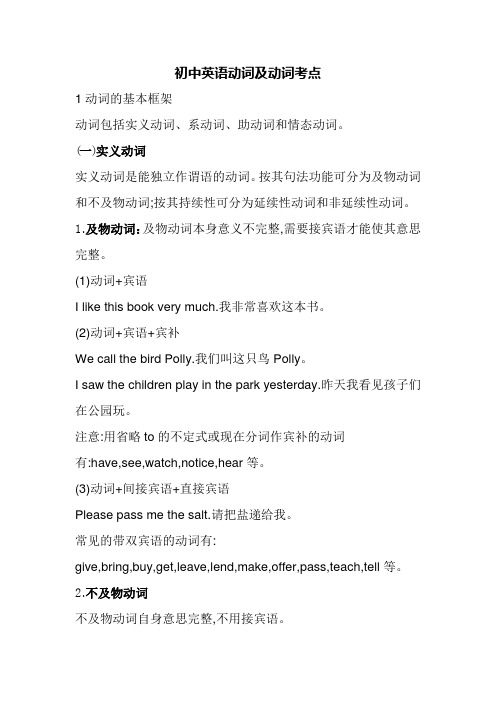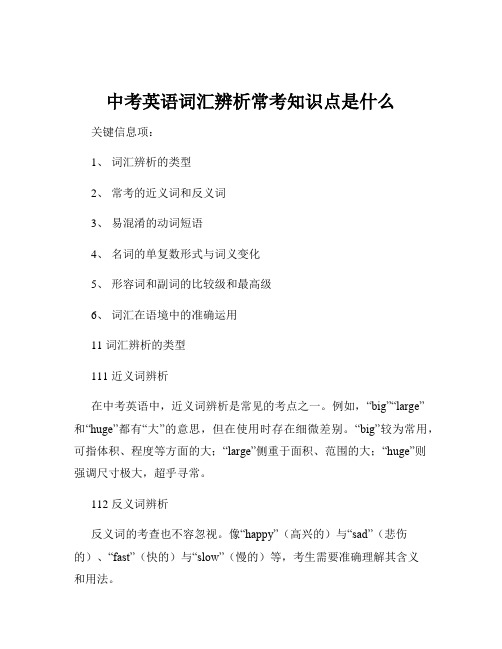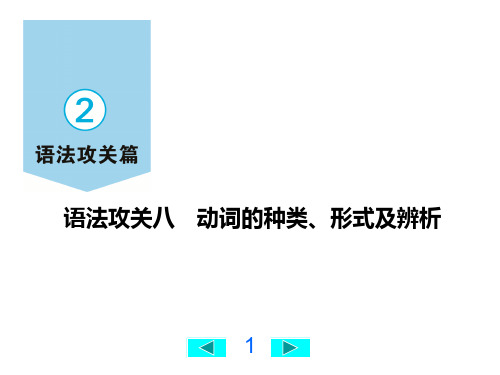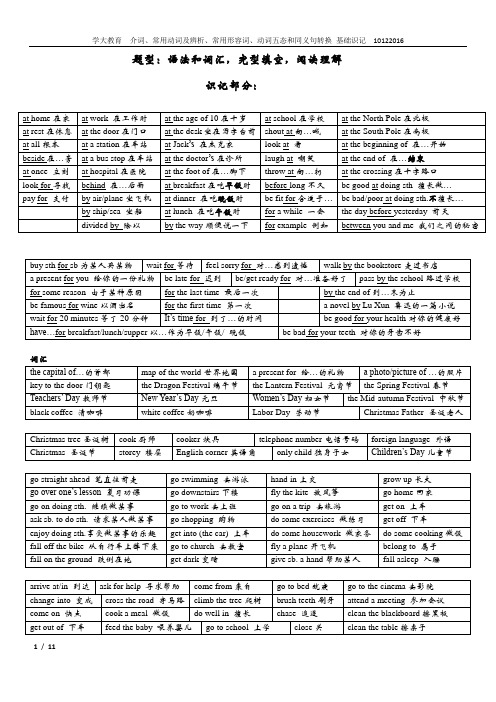初中英语重点短语--常用动词词组--近义动词辨析
初中英语动词及动词短语考点

初中英语动词及动词考点1动词的基本框架动词包括实义动词、系动词、助动词和情态动词。
(一)实义动词实义动词是能独立作谓语的动词。
按其句法功能可分为及物动词和不及物动词;按其持续性可分为延续性动词和非延续性动词。
1.及物动词:及物动词本身意义不完整,需要接宾语才能使其意思完整。
(1)动词+宾语I like this book very much.我非常喜欢这本书。
(2)动词+宾语+宾补We call the bird Polly.我们叫这只鸟Polly。
I saw the children play in the park yesterday.昨天我看见孩子们在公园玩。
注意:用省略to的不定式或现在分词作宾补的动词有:have,see,watch,notice,hear等。
(3)动词+间接宾语+直接宾语Please pass me the salt.请把盐递给我。
常见的带双宾语的动词有:give,bring,buy,get,leave,lend,make,offer,pass,teach,tell等。
2.不及物动词不及物动词自身意思完整,不用接宾语。
Horses run fast.马跑得快。
(1)有些动词既可作及物动词又可作不及物动词。
We study English.我们学习英语。
(及物动词)We study hard.我们努力学习。
(不及物动词)(2)有些不及物动词与一些别的词搭配在一起构成动词短语,它的作用相当于一个及物动词。
①动词+介词Listen to the teacher carefully.仔细听老师讲。
此类动词短语后面的宾语无论是名词还是代词,都只能放在介词后面,不能放在动词和介词之间。
②动词+副词+介词Let’s go on with our work!让我们继续我们的工作吧!He gets along well with his classmates.他与他的同学们相处得很好。
中考英语词汇辨析常考知识点是什么

中考英语词汇辨析常考知识点是什么关键信息项:1、词汇辨析的类型2、常考的近义词和反义词3、易混淆的动词短语4、名词的单复数形式与词义变化5、形容词和副词的比较级和最高级6、词汇在语境中的准确运用11 词汇辨析的类型111 近义词辨析在中考英语中,近义词辨析是常见的考点之一。
例如,“big”“large”和“huge”都有“大”的意思,但在使用时存在细微差别。
“big”较为常用,可指体积、程度等方面的大;“large”侧重于面积、范围的大;“huge”则强调尺寸极大,超乎寻常。
112 反义词辨析反义词的考查也不容忽视。
像“happy”(高兴的)与“sad”(悲伤的)、“fast”(快的)与“slow”(慢的)等,考生需要准确理解其含义和用法。
113 形似词辨析一些词汇在拼写和发音上相似,但词义完全不同。
如“quite”(相当)和“quiet”(安静的),“accept”(接受)和“except”(除之外)。
12 常考的近义词和反义词121 常见的近义词“look”“see”“watch”都与“看”有关,但“look”强调看的动作,“see”侧重于看的结果,“watch”则常指观看活动、比赛等。
“spend”“cost”“take”“pay”都有“花费”之意,“spend”主语是人,“cost”主语是物,“take”通常用于“it takes sb some time to do sth”句型,“pay”常与“for”搭配。
122 常见的反义词“good”与“bad”、“right”与“wrong”、“many”与“few”、“much”与“little”等反义词在中考中经常出现,需要考生清晰掌握其用法和区别。
13 易混淆的动词短语131 由“put”构成的动词短语“put on”(穿上)、“put off”(推迟)、“put up”(张贴;举起)、“put away”(收拾好)等,这些短语的含义和用法各不相同。
中考英语复习语法攻关八 动词的种类、形式及辨析

情态 动词
用法
例句
1.表示能力,意为 Mike can run fast.迈克能
can
“能、会”2.表示允 跑得快。(能力)Can I use 许、请求,意为“ your pen?我能借用你的
可以”
钢笔吗?(请求)
can't
1.意为“不会,不 能”2.表示否定推
测,语气强烈。 意为“一定不,不 可能”,可能性几 乎为零
21
am/is/ 帮 助 构 成 现 在 进 行 时 :
be have will/
are was/ were have/ has
had
will/ shall
am/is/are+现在分词 帮助构成过去进行时: was/were+现在分词 帮助构成现在完成时: have/has+过去分词 帮助构成过去完成时:had +过去分词
mustn't
意为“一定不要, 禁止”
You mustn't play in the street.你不准在街上玩 耍。
Tom could write when he was four.汤姆四岁时就能写字。( 过去的能力) Could I go out?我可以出去 吗?(请求) Could you sweep the floor? 你 可以扫一下地吗?(要求)
couldn't
意为“不会,不能 ”
The little boy couldn't dress himself.这个小男孩不会自己 穿衣服。
帮助构成一般将来时: will/shall+动词原形
在该时态 的助动词 后 加 not 变否定句; 把助动词 提到主语 前变疑问 句
动词及动词短语(17张PPT)初中英语专项复习课件

动
词
的
第 ①一般动词在词尾加-s。如:look-looks; get-gets
基
动 词 和
动本 词
形
三 ②以s, x, sh, ch结尾加-es。如:address-addresses; box-boxes; finish人 finishes; touch-touches
动
称 ③以"辅音字母+y"结尾的词,变y为i加-es。如:study-studies
动词
中考主要是在语境中对动词进行考查,常见命题角度: (1)实义动词辨析。 中考选择填空和完形填空中都常涉及对实义动词辨析的考查,做题时: ✓ 首先要明确动词的含义; ✓ 然后通过分析语境找出关键词,或根据前后的逻辑关系确定答案。
动词
常考的几组近义动词: ①divide与separate ②hear, listen与sound ③invent, discover, create与find ④cost, spend, pay与take
规 则 变 化
过去分词
不规则变 化
动
词
的
基
动 词 和 动 词
动本 词
形 式
①一般动词在词尾加-ing:go-going; look-looking ②以不发音的e结尾的词,去e加-ing:come-coming; use-using 现 ③以辅音字母结尾的重读闭音节词,双写该辅音字母加-ing:begin在
类
sound, seem, feel, stay, turn, get, keep, remain
助动词 没有词义,不能单独作谓语:be, do/does/did, have/has/had, will, shall
初中英语中考动词语境辨析与动词搭配专项复习(含练习题和答案)

中考英语动词语境辨析与动词搭配一、动词语境辨析(一)实义动词词义辨析中考对实义动词的考查主要涉及单项填空和完形填空两种题型,考查特点主要为语境辨析。
根据上下文考查其在语境中的辨析。
解答语境辨析类试题时,首先要确定四个动词的含义,然后分析语境,找出关键词或前后的逻辑关系,确定正确答案。
因此考生在平时的学习过程中,需要重点积累并掌握实义动词的用法。
如:--I ___ the school bus this morning.--Luckily, Tom’s father gave me a ride.A.tookB.caughtC.sawD.missed方法点拨第1步:四个选项的含义分别是:带走,乘(交通工具);抓住;看见;错过。
第2步:分析语境“我今天早上校车。
幸运地是, 汤姆的爸爸载了我一程。
”从句中的关键词“Luckily”和“gave me a ride”可知“我” 今天早上应该是“没搭上(错过了)校车”,故选D。
(二)近义动词词义辨析中考对近义动词的辨析涉及,主要考查学生对近义词的辨析应用,此类试题要求学生掌握各近义词的不同用法、固定搭配及句型,注重细节的考查。
1.三个“借”borrow 非延续性动词,表示主语“借入”,常用搭配borrow sth.from sb.lend 非延续性动词,表示主语“借出”,常用搭配lend sth.to sb.或lend sb.sth.keep 延续性动词,表示“长时间地借”2.三个“到达”get get to+地点名词reach及物动词,后面可直接跟地点名词reach 及物动词,后面可直接跟地点名词arrive in+大地点(名词)at+小地点(名词)3.三个“穿”dress dress sb.给某人穿衣服 dress sb.up 打扮某人put on 穿上,戴上,表示动作wear 穿着,戴着,表示状态4.四个“花费”spend 人作主语,表示花费时间或金钱,后接on sth.或(in) doing sth.cost 物作主语,表示“某物花费多少钱”take 可用于固定句型,表示“花费一段时间做某事”,其结构为:It+takes/took+一段时间+to do sth.pay 常与介词for连用,表示“支付”5.四个“看”see “看见”,表示结果look “看”,表示动作,是不及物动词,后面需加介词at才能跟宾语watch “观看(比赛、电视等)”read “看(书、报等)”,表示阅读6.四个“说”speak 作及物动词时后接表示语言的名词,表示“说,讲述”say 常跟直接引语或间接引语,表示说的内容talk 是不及物动词,常跟介词to和with,意为“同……谈话”,也表示具有说话能力tell 意为“告诉”,与story连用,意为“讲故事”7.四个“拿”bring “带来,拿来”,表示拿到靠近说话人的地方take “拿去,带走”,表示拿到远离说话人的地方carry “扛,搬,用力移动”,没有方向fetch “去取,去拿”,表示往返拿东西8.四个“赢,输”lose 意为“输给”某人,固定搭配为lose to sb.fail 意为“失败”或“未做成某事”beat 意为“打败”,后接人或某支队伍win 意为“赢得,荣誉,地位,比赛等”9.四个“参加”join 一般指加入“党派”或“组织”并成为其中一员,如参军,入党,入团等join in 指参加竞赛、娱乐、游戏等活动take part in 指参加聚会或群众性活动attend 一般指出席会议、典礼、婚礼等10.四个“变化”turn 一般用于颜色的变化get 天变黑、变长或变短become 天气变暖或变冷等,表示渐变grow 形状变大或变小(三)感官动词词义辨析sound 意为“听起来……”指听觉。
介词、常用动词及辨析、常用形容词、动词五态和同义句转换 基础识记(完整版)

题型:语法和词汇,完型填空,阅读理解识记部分:词汇动词辨析形容词同义、近义And you? ---How/What about you? 你呢?Can I help you? ---What can I do for you? 我能为你做点什么?How do you like…? --- What do you think of …? 你觉得…怎么样?How is the weather? ---What’s the weather like? 天气怎么样?Take it easy. --- Don’t be nervous. 别紧张。
That’s all right. --- Never mind. 没关系。
The book belongs to me. ---The book is mine. 这本书是我的。
What’s the matter? ---What’s wrong? 怎么了?What’s your favorite sea son? ---Which season do you like best? 你最喜欢哪个季节?What’s your job? ---What do you do? 你做什么工作的?You’re welcome. ---That’s all right. / Not at all.不用谢。
She comes from America. ---She is from America. / She is American.她是美国人。
不规则动词过去时变化表不定冠词(注意斜体字和加下划线的部分)介词介词from的搭配介词in的搭配介词like的搭配副词away和down的搭配副词out的搭配介词on的搭配同义句识记部分1.Jane is good at making model ships.Jane does well in making model ships.2.Morning is my favorite time of day.I like morning best.3.This schoolbag is too small for my books.I need a bigger schoolbag for my books.4.Most boys like history and geography.A lot of boys like history and geography.5.Mike watches TV before he does his homework.Mike watches TV first and then he does his homework.1.There are a lot of emails for her every day.Many people email her.2.I need more time for my homework.I want more time to do my homework.3.Tom does n’t f eel well today.Tom is sick today.4.We will make a second visit to the zoo.We will go to the zoo again.5.People always see Rose and Jenny together.Rose and Jenny are always together.1.How is the weather today?What is the weather like today?2.---Thank you for your help. ---You’re welcome.Not at all.3.---Are you free on Saturday or Sunday? ---Either is OK for me.I’m free on both days.4.What’s your father’s job?What does your father do?5.How do you like your new school?What do you think of your new school?依葫芦画瓢,将剩下的划完!可对照一起发下来的词汇部分!加油(⊙o⊙)哦!1.I like English better than math.I prefer English to math.2.Mr. Smith goes to work on foot.Mr. Smith walks to work.3.Would you like some candies?Do you want to have some candies?4.Don’t shout here.You must not speak loudly here.5.Excuse me, I can’t hear you.Please speak louder.1.How beautiful the lake is!What a nice lake!2.I needn’t get up early tomorrow.I don’t have to get up early tomorrow.3.The man in blue in John’s father.The man wearing a blu e coat is John’s father.4.I like none of these pictures.I don’t like any of these pictures.5.The department store has a good location.The department store is in a nice place.1.There was a knock on the door.Somebody was knocking at the door.2.I’d like to go swimming after class.I want to go swimming after class.3.Look out!Be careful!4.Tom is chasing a chicken in the garden.Tom is running after a chicken in the garden.5.It’s our last lesson of the term.We won’t have any more lessons this term.1. A long time ago I went to the Ocean Park.Many years ago I went to the Ocean Park.2.The twins wear different clothes.The clothes of the twins are not the same.3.May I have some oranges?Can I have some oranges?4.Let’s go to Central Park on Saturday.Shall we go to Central Park together on Saturday?5.Mr. Johnson went to Beijing by plane.Mr. Johnson flew to Beijing.1.I think Zhou Jielun’s songs are super.I think Zhou Jielun’s songs are wonderful.2.We got to the airport at five o’clock.We arrived at the airport at five o’c lock.3.We enjoyed ourselves at the party.We had a good time at the party.4.There is a sofa beside the window.There is a sofa by the window.5.Thank you. I’m full.Thank you. I can’t eat any more.1.I can’t finish it in an hour.An hour is not enough for me to do it.2.Linda had little for breakfast this morning.Linda almost ate nothing t this morning.3.Can you show me the way to the museum?Can you tell me the way to the museum?4.The exam is not difficult. Take is easy.Don’t be nervous.5.I knew nothing about him.I didn’t know him.1.Don’t feed the duck.Don’t give any food to the duck.2.The table cloth feels very rough.The table cloth is not smooth.3.Sorry, I have no idea.Sorry, I don’t know.4.I’m new here.It’s my first time here.5.Kate’s family is always busy.All the members of Kate’s family are always busy.1.It’s Sunday.It’s the first day of the week.2.John is going to the cinema with Peter this afternoon.John is going to see a movie with Peter this afternoon.3.Hold on, please.Just a minute, please.4.Can I help you?What can I do for you?5.We go to school from Monday to Friday.We go to school on weekdays.1.Shut the door, please.Close the door, please.2.I go to see my grandparents once a month.I visit my grandparents once a month.3.You are wanted on the phone.There is a phone call for you.4. It is time for school.It’s time to go to school.5. That Transformer is too dear for Mike.The Transformer is too expensive for Mike.1.Shall I see you at noon?B Shall I see you at 12 o’clock?2. Mike prefers meat to fish.Mike likes meat better than fish.3. He can speak a little English.He can’t speak much English.4. Harry potter is very popular with kids all over the world. Many children like watching Harry potter.5. Most boys like football.A lot of bots like football.1.Jessie borrowed some books from Peter.Peter lent some books to Jessie.2.Not all the butterflies are white.Some of the butterflies are white.3.Jimmy likes English best.English is Jimmy’s favorite subject.4.Ann likes the food a lot.Ann really enjoys the food.学大教育介词、常用动词及辨析、常用形容词、动词五态和同义句转换基础识记10122016 5.There is a lot of traffic today.The traffic is heavy today.6.He can speak a little Chinese.He can speak some Chinese.7.Lucy is the tallest of the ten girls.Lucy is taller than the other nine girls.8.My friends enjoyed themselves in the park.My friends had a good time in the park.9.Most children like to go to the zoo.A lot of children like to go to the zoo.10.Joan likes reading better than writing.Joan prefers reading to writing.11.He is never late for school.He always goes to school on time.12.Why not go and have a look?Let’s go there and have a look.13.I know nothing about her.I don’t know her at all.14.The box is too heavy for me.I can’t carry the heavy box.15.Julia has very little for supper.Julia eats almost nothing for supper.1.It’s a sunny day.The sun is shining brightly today.2.Mike prefers basketball to football.Mike likes basketball better than football.3.Don’t feed the fish now.Don’t give any food to the fish now.4.Sorry, I’m new here.Sorry, I don’t know much about this pl ace.5.That toy car is too dear for me.I don’t have enough money for the toy car.11 / 11。
【中考英语考点详解+专项训练】专题8 动词 (原卷版)
动词是用来描述主语的动作行为或状态的一类词。
动词在句中作谓语,用来说明主语是什么、处于什么状态或做什么。
动词有不同的形式,这些形式体现了动作发生的时间、语态等信息。
中考对动词的考查方式灵活、题型多样。
在备战中考时,考生要牢记近义动词及动词短语的不同含义,多做练习,在实践中加以区分。
中考考查重点:1. 动词辨析;2. 动词短语辨析。
考向一:动词的分类分类特点例句实义动词表示动作或状态,有完整的词义,能独立作谓语。
按其带不带宾语可分为及物动词和不及物动词。
Give me some ink, please. 请给我一些墨水。
He works hard. 他工作努力。
连系动词本身有词义,不能独立作谓语,必须和表语一起构成谓语,说明主语的状态、性质、特征或身份等。
He is a teacher. 他是一位老师。
They look the same. 他们看起来一样。
助动词本身无词义,不能独立作谓语,只能和实义动词一起构成谓语。
可用来表示否定、疑问、时态、语态、语气等。
I am watching TV. 我正在看电视。
I don’t speak English. 我不说英语。
情态动词本身有一定的意义,表示人的语气和情态,不可单独作谓语,须和实义动词或系动词一起构成谓语。
Tom can swim. 汤姆会游泳。
May I come in? 我可以进来吗?分类用法例句—What will a science museum be like if you are asked to build one?—I hope it will _____________ like a book.A. tasteB. soundC. lookD. smell【答案】C【解析】问句中的a science museum为建筑物,故答语中应该用look like,表示"看上去像……",其余选项不符合句意。
考向四:助动词以重读闭音节结尾,词尾只有一个辅音字母的动词,先双写辅音字母,再加-edstop→stopped;plan→planned 考向六:动词短语构成方式常见短语动词+冠词+名词give a concert开音乐会,give a tea进行测试,have a rest休息,have a picnic 野餐,have a try试一试,keep a record保持纪录,leave a message留言,make a face做鬼脸,make a living谋生,make a speech进行演讲,pay a bill付账,take a risk冒险动词+名词catch fire着火,keep watch守望/值班,make repairs维修,play sports做运动,take action采取行,take measures采取措施,take place发生/举行动词+名词+介词catch hold of抓住,catch sight of看见,make contributions to对……做贡献,make room for给……腾地方,make use of利用,pay attention to注意,take advantage of利用,make contact with和……接触/联系,take pride in以……为豪动词+介词+名词come into use开始使用,get into trouble陷入麻烦,play with fire玩火/冒险,wait in line排队等候动词+宾语+介词+名词bring... to mind使想起,put... into use应用,put... into practice实行/实施,take... for example以……为例动词+副词+介词add up to合计达,break away from脱离,come up with想出/提出,catch up with 赶上,追上,go ahead with开始,着手,go in for参加/追求,go along with一起去,hold on to坚持,keep away from远离,look down upon瞧不起/轻视,put up with忍受/容忍,run out of用完Spring has come. We can’t _____________ the plan. The trees must be planted this week.A. put offB. make upC. come up withD. look up【答案】A【解析】由句意可知,春天来了,我们不能推迟计划。
中考英语必考动词的分类及辨析,为孩子打印收藏!
中考英语必考动词的分类及辨析,为孩子打印收藏!在英语中,动词的使用形式变化多样,与汉语语法截然不同,因此成为我们学习中的一大难点。
由近几年中考题可以看出动词为单项选择题的必考点,尤其是对动词短语的考查,偏向take、turn、put、down等。
考查形式主要集中在三个方面:①同一动词+不同介词;②不同动词+同一介词;③不同动词+不同介词。
对动词的考查侧重感官系动词词义的辨析,也偶尔涉及实义动词的辨析。
设题形式均为简单句。
一、系动词系动词不能单独作谓语,必须跟表语一起构成谓语。
常用的系动词分类如下:(1)be动词:am, is, are, was, were(2)感官类:look, sound, smell, taste, feel(3)变化类:become, get, grow, go, turn(4)状态类:keep, stay二、助动词助动词本身没有词义,不能单独作谓语,只能和其他动词一起构成谓语,表示时态、语态、语气等特征,共同构成否定、疑问、强调、省略等句子。
主要的助动词有be, have, has, had, do, does, did, will, would和shall等。
三、实义动词实义动词是能独立作谓语的动词。
按其语法作用分为及物动词和不及物动词;按其持续性可分为延续性动词和非延续性动词。
1.及物动词及物动词本身意义不完整,需要接宾语才能使其意思完整。
(1)动词+宾语如:Can you open the window?(2)动词+宾语+宾补如:We call him Bill.I saw Tom play in the park yesterday.注意:用省略to的不定式或现在分词作宾补的动词有make, let, see, watch, hear, notice等。
(3)动词+间接宾语+直接宾语如:May I ask you a question?Please pass me the book.常见的带双宾语的动词有:give, bring, buy, get, lend, offer, pass, teach, tell, write, return等。
(完整版)初中英语常用动词搭配和动词短语以及辨析
(完整版)初中英语常用动词搭配和动词短语以及辨析初中英语常用动词搭配1. 动词后接to doask sb. to do sth.请(叫)某人做某事tell sb to do sth 告诉某人做某事order sb to do sth. 命令某人做某事want sb to do sth. 想要做某事help sb. (to) do sth. 帮助某人做某事wish sb to do sth. 希望某人做某事would like to do sth. 想要做某事invite sb. to do sth. 邀请某人做某事drive sb. to do sth .驱使某人做某事expect sb. to do sth. 期待某人做某事forbid sb. to do sth. 制止某人做某事force sb. to do sth. 强迫某人做某事hope to do sth. 希望做某事offer to do sth. 主动提出做某事plan to do sth. 计划做某事prepare to do sth. 预备做某事pretend to do sth. 假装做某事promise to do sth. 许诺做某事decide to do sth. 决定做某事refuse to do sth. 拒绝做某事fail to do sth. 未能做某事happen to do sth. 碰巧做某事need sb to do sth 需要某人做某事2.动词后接ingconsider doing sth. 考虑做某事enjoy doing sth. 喜欢做某事escape doing sth. 逃脱做某事feel like doing sth. 想要做某事finish doing sth. 完成做某事give up doing sth. 放弃做某事imagine doing sth. 想象做某事mind doing sth. 介意做某事practice doing sth. 练习做某事prevent doing sth. 阻止做某事put off doing sth. 推迟做某事risk doing sth. 冒险做某事forbid doing sth. 制止做某事forgive doing sth. 原谅做某事stop sb.from doing 阻止某人做某事appreciate doing sth. 感激做某事suggest doing sth. 建议做某事be/get used to doing sth. 习惯做某事pay attention to doing 注意做某事avoid doing 避免做某事3. 动词后既接to又接ing(1) remember to do sth. 记得要做某事remember doing sth. 记得做过某事(2)forget to do sth. 忘记要做某事forget doing sth. 忘记做过某事(3) regret to do sth. 遗憾要做某事regret doing sth. 遗憾做过某事(4) try to do sth. 尽力做某事try doing sth. 试着做某事(5)stop to do sth. 停下来去做某事stop doing sth. 停止做(正在做的)某事(6) mean to do sth. 打算做某事mean doing sth. 意味着做某事(7) can’t help to do sth. 不能帮助做某事can’t help doing sth. 情不自禁做某事(8) go on/continue to do sth. 继续做另一件事go on/continue doing sth. 继续做同一件事(9) like/love/hate to do sth 具体活动(一次性)like/love/hate doing sth 表示习惯(一贯性)(10) need/want to do sth. 想要做某事(主动)need/want doing sth. 想要被做(被动)(11) allow sb. to do sth. 允许某人做某事allow doing sth 允许做某事(12) advise sb. to do sth. 建议某人做某事advise doing sth. 建议做某事(13) encourage sb. to do sth. 鼓励某人做某事encourage doing sth. 鼓励做某事(14) permit sb to do sth 允许某人做某事permit doing sth 允许做某事4. 动词后接动词原形do(1) let sb. do sth. 让某人做某事(2) make sb. do sth. 使某人做某事=make sth done(3)have sb. do sth. 使某人做某事=have sth done(4)see sb. do sth. 看见某人做过某事see sb. doing 看见某人正在做某事(5)hear sb. do sth. 听见某人做过某事hear sb. doing 听见某人正在做某事(6)find sb. do sth. 发现某人做过某事find sb. doing sth. 发现某人正在做某事(7)watch sb. do sth. 察看某人做某事(8)had batter do sth. 最好做某事4.接双宾语(一)双宾语易位时需借助介词to的常用动词(多表示动词的方向)bring sb. sth. = bring sth. to sb. 把某物带给某人hand sb. sth. =hand sth. to sb. 把某物递给某人lend sb. sth. = lend sth. to sb. 把某物借给某人mail sb. sth. = mail sth. to sb. 把某物寄给某人offer sb. sth. = offer sth. to sb. 将某物给某人pass sb. sth. = pass sth. to sb. 把某物递给某人pay sb. sth. = pay sth. to sb. 付给某人某物(钱)read sb. sth. = read sth. to sb. 把某物读给某人听return sb. sth. = return sth. to sb. 把某物还给某人sell sb. sth. = sell sth. to sb. 把某物卖给某人send sb. sth. = send sth. to sb. 把某物送给某人show sb. sth. = show sth. to sb. 拿某物给某人看take sb. sth. = take sth. to sb. 把某物拿给某人teach sb. sth. = teach sth. to sb. 教某人某物tell sb. sth. = tell sth. to sb. 告诉某人某情况throw sb. sth. = throw sth. to sb. 把某物扔给某人write sb. sth. = write sth. to sb. 给某人写信(二)双宾语易位时需借助介词for的常用动词(多表示动词的目的)book sb. sth. = book sth. for sb. 为某人预定某物buy sb. sth. = buy sth. for sb. 为某人买某物choose sb. sth. = choose sth. for sb. 为某人选某物cook sb. sth. = cook sth. for sb. 为某人煮某物draw sb. sth. = draw sth. for sb. 为某人画某物find sb. sth. = find sth. for sb. 为某人找到某物get sb. sth. = get sth. for sb. 为某人拿来某物make sb. sth. = make sth. for sb. 为某人做某物order sb. sth. = order sth. for sb. 为某人订购某物pick sb. sth. = pick sth. for sb. 为某人采摘某物prepare sb. sth. = prepare sth. for sb. 为某人准备某物save sb. sth. = save sth. for sb. 为某人留某物sing sb. sth. = sing sth. for sb. 为某人唱某物(歌)steal sb. sth. = steal sth. for sb. 为某人偷某物初中英语常用动词短语整理5. Be 动词结构be able to do 能够做……be afraid to do (内心)害怕\不敢做某事be afraid of doing担心出现doing的状况、结果be angry with 对……生气be at home = stay at home 待在家里be back/in/out 回来/在家/外出be bad for 对……有害be busy doing/with sth忙于做……(忙于……) be careful of 当心,注意,仔细be covered with 被……覆盖be different from与……不同be famous/known as 作为……出名be famous/known for 以……而著名be free 空闲的,有空be friendly/kind to对……友好be from = come from 来自…,什么地方人be full of/filled with装满……be good at= do well in 擅长于…be good for对……有好处be (ill) in bed 卧病在床be interested in 对……感兴趣be in trouble 处于困境中be late for 迟到be mad at 对……生气be made from/of 由……制成be made in 在……地方制造be made up of由……构成be on 在进行,在上演,(灯)亮着be pleased with对…感到高兴be polite/impolite to对某人有礼貌/不礼貌be popular with受……欢迎;be proud of对……感到自豪be ready for 为……作好准备be satisfied with对……感到满意(高兴)be surprised (at) 对……感到惊讶be strict in sth.对某事严格be strict with sb.对某人严格be supposed to do sth.应该做某事be used for doing被用来做某事be used to do被用来做某事be used to doing 习惯于be worried about =be anxious about 担忧6.短语(首字母排列)aim at 针对…agree with sb. 同意某人的意见或建议ask for请求、索要ask for a day off请一天假add…to…把…和…加起来achieve a victory取得胜利arrive in到达﹙大地方﹚arrive at到达﹙小地方﹚argue with 与…争吵apologize to 向…道歉break up with sb.与某人断绝关系break out 爆发break down 出毛病,拆开break off解散,解雇break the rule违规break into破门而入believe in信任begin/start with以…开始belong to属于…built…into…把…建成…base on以…为基础borrow…from…向…借……come into being形成、出现come true 实现come for a visit来参观come on 快,走吧,跟我来come back回来come to do sth.逐渐做某事come about 发生come from来自…come up with 提出主意想法come along出现、发生come over过来come into进入…里come in 进来come out出来,出现,出版come out of从…里出来catch up with 赶上…catch a fire着火catch hold of抓住…catch a bus赶公共汽车cut up 切碎cut in half 切成半cut off切断﹙电源、水源﹚cut in line插队care for关心、关爱care about在意call for号召call back回电话call at sp. 拜访某地call on sb.拜访某人call out呼喊call up给…打电话call sb. at some number给某人打某个号码calm down 镇静下来communicate with 与…交流complain about 抱怨…can’ t wait to do sth.迫不及待做某事clean up 清理、打扫干净carry out 执行connect …to…把…和…连起来chat on line网上聊天check over检查drop by 顺便拜访drop out of school辍学drop litter丢垃圾do an experiment 做实验do an operation on sb. 给某人做手术do sth. in person亲自做某事do business做生意do exercise 做操do with=deal with处理do wrong 做错事do one’s homework =do one’lesson做作业do some sports做运动do morning exercises 做早操do well in做得好,擅长于do the dishes 洗餐具do one’s best to do sth.尽力做某事do some cleaning 扫除do some reading读书do some shopping购物do some cooking做饭do the laundry洗衣服do some chores做杂务disagree with sb. 不同意某人意见describe…as…把…描绘为…die of 死于﹙直接内因,如疾病、饥渴﹚die from死于﹙间接外因,如车祸、天灾﹚die out 灭绝drive sb. crazy使某人发疯drive to…开车去…divide…into…把…分成…depend on依赖…decide on sth. 对……做决定dry out干涸dry up 烘干dream of 梦想…draw up起草、拟定dress up 装扮、打扮e-mail sb.给某人发电子邮件enjoy oneself 玩得愉快enjoy doing sth. 喜欢做某事end up doing sth.结束做某事explain to sb sth=explain sth. to sb. 向某人解释某事eat up吃光fall behind落后fall off 从……掉下fall down 滑到,倒下(后接宾语要加from)fall over向前摔倒、跌倒fall into 落入;陷入fall ill病倒fall asleep入睡fall in love with爱上、迷恋fight against与…作斗争follow the rules 遵守规则fail the exam考试不及格find out查明﹙原因、真相﹚feel like doing 想做某事fly a kite 放风筝fly to乘飞机去…fit into …适应…fill in =fill out 填充填写fill…with…用…填…feel sorry for因…而难过fold the clothes叠衣服get on 上﹙车、船、飞机等﹚get off下﹙车、船、飞机等﹚get up起来、起床get good grades 取得好成绩get over 客服get rid of 除掉…get to到达get out of 从…里出来get into 进入get in the way of妨碍get together 聚会get into trouble陷入困境get out of trouble 脱离困境get used to﹙doing﹚sth.习惯﹙做﹚某事get to do sth.着手做某事get ready for为…做准备get sb. into trouble使某人陷入困境get away from远离…get a sore back 背痛get back to sb. 过会儿与某人通话﹙打电话用语﹚get on/along well with 与相处…融洽get to know认识get married to与某人结婚get in touch with 与…取得联系go ahead 先走,向前走,去吧,干吧go to…去…go home 回家go out 出去go out for…出去做…go down/along 沿着…走go to school上学go to the docto r’去医务室go to the cinema 去看电影go across…穿过…﹙平面﹚go to work上班go bad变坏go by流逝﹙时间﹚go one’s own way走自己的路go for a walk 去散步go sightseeing去观光go away 走开go to sleep 入睡go to bed 上床睡觉go on with继续…go shopping 去购物go hiking 去远足go abroad 出国go over复习go downstairs/upstairs下楼/上楼go on a trip 去旅游give in﹙doing﹚sth.屈服﹙做﹚某事give up﹙doing﹚sth.放弃﹙做﹚某事give away 赠送give out 颁发give back 归还give off 发出﹙气味、烟雾等﹚give sb. some advice给某人提建议give a talk作报告give lessons to sb. 给某人上课give sb. a good beating 好好教训某人一下give sb. a hand 帮某人忙grow up 长大have a good time 玩得愉快have a discussion 进行讨论have a party 举行聚会have a meeting 开会have nothing to do with与…无关have trouble with sth. 做某事有困难have difficulty/ trouble doing sth. 费力做某事have fun玩得愉快have a fever 发烧have a cold 感冒have a cough 咳嗽have a stamachache胃痛have fun doing sth.愉快地做某事have a match 举行比赛have a fight with与…比赛、斗争have no idea of 不知道…have a hard time doing sth. 艰难地做某事have sth. to do with 与…有关have an accident 发生事故have breakfast/lunch/supper 吃早、午、晚饭have class上课have water喝水have a conversation with 与…会话have a look at 看一下…have a talk with与…谈话have a problem with做某事有疑难have a good trip路途愉快have a try 试一下have a laugh at 嘲笑.…have a pity on sb.同情某人have a rest 休息一下have a word with 与……谈几句话hear of 听说hear from 收到…的来信hands up举手hand in上交hand out分发hold up 抓住、握住hold a meeting 举行会议hold an exhibition举行展览happen to do sth.恰巧做某事hurry up 赶快hurry off 匆忙离开help oneself to sth. 随便用…help sb. with sth.帮助某人做某事It’s one’s turn to do sth. 轮到某人做某事invite sb. to do sth.邀请某人做某事insist on doing sth..坚持做某事join in 穿着join together团结起来join the army 参军join the party入党keep(stay)away from 远离keep out不让进入keep down 压低﹙音量等﹚keep a pet 饲养宠物keep in good mood 保持好心情keep on doing一直做某事keep healthy保持健康keep in good health保持健康keep up with跟上…keep sb. doing sth. 使某人一直做某事keep off 防御keep in touch with与…保持联系knock at=knock on敲…knock into撞到某人身上learn…by oneself 自学…learn…from …向…学习learn…by heart 记住…leave for离开去某处leave sth. somewhere 把某物忘在某处leave school毕业leave one by oneself 把某人单独留下leave a message for sb.给某人留个口信lead to导致live on…以…为生live a happy life 过着幸福的生活look after照看…look for 寻找…look down on 藐视…look up查找﹙字词等﹚look over检查﹙身体等﹚look forward to盼望…look on …as 把看作…look at看…look like 看起来像…look around环顾look out当心look out of 向…外面看look through 浏览look the same 看起来一样look inside向…里面看laugh at嘲笑lose touch with与…失去联系let sb. in 让某人进去lie dowm躺下make sb. feel at home使某人感到宾至如归make one’s mind to do sth. 决心做某事make a face=make faces 做鬼脸make money挣钱make fool of sb.愚弄某人make a journey旅行make progress 取得进步make a countribution to为…做贡献make a noise 吵闹make a fire 生火make a mistake 犯错误make…of…由…制作…﹙看出原材料﹚make…from…由…制作…﹙看不出原材料﹚make up编造,虚构,打扮,构成,组成make up of…由…组成make a plan 定计划make one’s bed 整理床铺make a report 编写报告make sure of确信…make use of 利用…make a sentence with用…造句make a decision做出决定make oneself understood 表达自己的意思make a survey of 调查…make preparation for 为…做准备make friends with与……交朋友make a living谋生major in专修match …with …把…和…搭配起来move to搬到…mistake…for…把…错认为…meet with 遇到﹙困难、麻烦等﹚mix up混合name sb./sth.X把某人/某物叫做Xorder sb. to do sth.命令某人做某事open up完全打开play football 踢足球play chess 下棋play cards打牌play bridge打桥牌play the guitar 弹吉他play the violin弹小提琴play sports 做运动play games 玩游戏play with 玩耍…play jokes on sb.对某人开玩笑play the CD.播放play the music 播放音乐play a part in在…中扮演角色play a role of 扮演…的角色play against与…比赛play hide-and-seek捉迷藏pay for付…款pay attention to 注意…pass by 路过…put on 穿上、上映put down 写下put away把…收拾起来put…into…把…放入…里put up 举起、张贴put out 熄灭put off 推迟put back 放回prevent sb.﹙from﹚doing sth.阻止某人做某事prefer to do rather than do与做另一件事相比更喜欢做某事prefer﹙doing﹚sth. to ﹙doing﹚sth. 与…相比更喜欢…point to 指向poin at 指着point out指出practice doing sth.练习做某事pick up 拾起,接人,站起,收听run away 逃跑run after 追赶run out of 用光、从…里跑出来run over to…跑过去到…read sth. to sb. 把某物读给某人听read sth. for sb. 替某人读某物receive a letter from…收…到来信rain heavily 下大雨ride a bike骑自行车rise up升起raise money 筹集资金refer to涉及、提到regard…as…把…看作…reach out 伸出﹙手等﹚send up发射send an e-mail 发送电子邮件send for…派人请…send…for…派…请…send into 送入…里send away驱逐send off解雇send out 发出,发出,派遣shake hands with与…握手stick…into…把…插入…里stick doing sth.坚持做某事stop sb. from doing sth.阻止某人做某事stare at 盯着…sell out买光see a doctor 看医生see sb. off为某人送行see a film 看电影say goodbye to sb.向某人告别say hello to sb.向某人问好set up 竖立、建造set up one’s mind on sth.全神贯注于…set off 出发,动身,使爆炸,引起set out 出发,启程,开始,着手set an example for 为……树立榜样speak of 讲到speak highly of 称颂…search for 搜索,寻找start to do sth.着手做某事start with …以…开始spend﹙time/money﹚on sth.= spend﹙time/money﹚﹙in﹚doing sth.花费﹙时间/金钱﹚做某事spend time with sb. 和某人呆在一起sort…into…把…划分成…show sb. around somewhere领某人参观某处show up 露面stay in bed 呆在床上slow down减速smile at对…微笑suit sb.适合某人share…with…与…分享…stay up 熬夜stand for代表,象征stand up起立succeed in doing sth.成功地做某事shut up关闭shout to (为了让人听到)对…喊shout at (因生气等)向…喊seem like 好像sweep the floor拖地step on 践踏,踩take a message for sb.给某人捎个信take a bus乘工交车take one’s order按某人的顺序take a walk 散步take…to…把…带到…去take a shower淋浴take after 与…相像take away 带走take the medicine 服药take exercise锻炼take it easy不要紧take one’s temperature量某人的体温take off 起飞/脱下﹙衣服、鞋帽等﹚take a lesson/class 上课take a day off 休一天假take an exam 参加考试take…out of…把…从…中取处来take a rest休息一下take one’s turn to do sth.按某人顺序做某事take part in 参加﹙活动﹚take…as an example拿…当作例子take over接管take care of照顾、照看take in吸取,吸收take up 占据﹙空间、时间﹚take the pride in 以…而骄傲﹙强调动作﹚take place 发生﹙不及物﹚take the leading position占主导地位take a swimming course上游泳课take a deep breath深呼吸take the place of 代替…take a photo of 照…的相talk about谈论…talk with 与…谈话talk to对…谈话turn left﹙right﹚向左﹙右﹚转turn up 调高﹙音量等﹚turn down调低﹙音量等﹚turn on打开﹙电器、煤气、水龙头﹚turn off 关闭﹙电器、煤气、水龙头﹚turn over翻开,翻转turn…into…把…变成…turn to…转向…turn green 变绿think about考虑、思考…think of想起、想到…think over仔细考虑think up想出(设计出、发明、编造)tell sb. about sth. 把某物的情况告诉某人tell a joke 讲笑话tell a story 讲故事try on 试穿try one’s best to do sth. .尽力做某事thanks for感谢…travel to …到…旅行tie…to…把…绑到…上treat …as…把…当作…来对待trouble sb. to do sth. 麻烦某人做某事throw away 扔掉translate…into…把…翻译成…urge sb. to do sth. 强烈要求某人做某事use up用尽used to do sth. 过去经常做某事visit sb/somewhere看望某人/参观某处wake up醒来、叫醒welcome to…欢迎到…来wait for等待…wait in line 排队等候write to …给…写信write down记下win the World Cup 赢得世界杯win a prize获奖wear out穿坏wear glasses戴眼镜wipe off 擦去,拭去work out 解决﹙问题、麻烦等﹚work on从事…walk along/down 沿着…走watch a game观看比赛warn sb. to do sth.告诫某人做某事warn sb. of sth. 警告某人某事warn sb. against(doing) sth.告诫某人当心某事/不要做某事worry about…担心…中考英语近义动词(词组)辨析1. 辨析take;cost;spend;pay主语为人的有spend和pay;主语为物的有cost;主语常为“it”的有take.(1)spend多用人作主语,后接金钱或时间。
初中英语语法:动词和动词短语(中考总复习)
四 “看”
强调精力比较集中地看,常用于看电视、体育活动 watch 或比赛 look 强调动作,即“看”,后接宾语时要加at
see 强调结果,即“看见,看到”
read 强调阅读,常指看书/报纸/杂志等
专题八 动词和动词短语
返回目录
bring 带来,拿来。强调从别处带到离说话人近的地方
让 学
take 拿去,带走。强调从说话处带到离说话人远的地方 四“拿”
B. hear
C. know
D. tell
试
8. Miss Yang usually sets out early in order to ________ the morning rush hour.
A. choose
B. cause
C. avoid
D. accept
练
9. It sounds like a good plan, but you should________it with your parents first.
1.先判定空格处是否填动词。
习
动词是用来描述主语的动作行为或状态的词,在句子
成
为
中作谓语,是句子不可缺少的部分,用来说明主语是什么、
一 种
处于什么状态或做什么。如果句中没有谓语,则可判定此处
习
应填动词。
惯
注意:有些词具备动词和名词双词性,考生需特别记忆。
专题八 动词和动词短语
返回目录
2.再确定是否需要变形。
A. compare B. complain C. receive
D. consider
7. Time will ________ whether you made the right choice or not. Hold on to it, and you
- 1、下载文档前请自行甄别文档内容的完整性,平台不提供额外的编辑、内容补充、找答案等附加服务。
- 2、"仅部分预览"的文档,不可在线预览部分如存在完整性等问题,可反馈申请退款(可完整预览的文档不适用该条件!)。
- 3、如文档侵犯您的权益,请联系客服反馈,我们会尽快为您处理(人工客服工作时间:9:00-18:30)。
初中英语重点短语--常用动词词组--近义动词辨析由be构成的词组1)be back/in/out 回来/在家/外出2)be at home/work 在家/上班3)be good at 善于,擅长于4)be careful of 当心,注意,仔细5)be covered with 被……复盖6)be ready for 为……作好准备7)be surprised (at) 对……感到惊讶8)be interested in 对……感到举9)be born 出生10)be on 在进行,在上演,(灯)亮着11)be able to do sth. 能够做……12)be afraid of (to do sth. that…) 害怕……(不敢做……,恐怕……)13)be angry with sb. 生(某人)的气14)be pleased (with) 对……感到高兴(满意)15)be famous for 以……而著名16)be strict in (with) (对工作、对人)严格要求17)be from 来自……,什么地方人18)be hungry/thirsty/tired 饿了/渴了/累了19)be worried 担忧20)be (well) worth doing (非常)值得做……21)be covered with 被……所覆盖……22)be in (great) need of (很)需要23)be in trouble 处于困境中24)be glad to do sth. 很高兴做……25)be late for ……迟到26)be made of (from) 由……制成27)be satisfied with 对……感到满意28)be free 空闲的,有空29)be (ill) in bed 卧病在床30)be busy doing (with) 忙于做……(忙于……)由come、do、get、give、go、have、help、keep、make、looke、put、set、send、take、turn、play等动词构成的词组31)come back 回来32)come down 下来33)come in 进入,进来34)come on 快,走吧,跟我来35)come out出来36)come out of 从……出来37)come up 上来38)come from 来自……39)do one's lessons/homework 做功课/回家作业40)do more speaking/reading 多做口头练习/朗读41)do one's best 尽力42)do some shopping (cooking reading, cleaning)买东西(做饭菜,读点书,大扫除)43)do a good deed (good deeds)做一件好事(做好事)44)do morning exercises 做早操45)do eye exercises 做眼保健操46)do well in 在……某方面干得好47)get up 起床48)get everything ready 把一切都准备好49)get ready for (=be ready for) 为……作好准备50)get on (well) with 与……相处(融洽)51)get back 返回52)get rid of 除掉,去除53)get in 进入,收集54)get on/off 上/下车55)get to 到达56)get there 到达那里57)give sb. a call 给……打电话58)give a talk 作报告59)give a lecture (a piano concert)作讲座(举行钢琴音乐会)60)give back 归还,送回61)give……some advice on 给……一些忠告62)give lessons to 给……上课63)give in 屈服64)give up 放弃65)give sb. a chance 给……一次机会66)give a message to……给……一个口信67)go ahead 先走,向前走,去吧,干吧68)go to the cinema 看电影69)go go bed 睡觉(make the bed 整理床铺)70)go to school (college) 上学(上大学) 71)go to (the) hospital 去医院看病72)go over 过一遍,复习/ go over to 朝……走去73)go fishing/skating/swimming/shopping 去钩鱼/滑冰/游泳/买东西74)go home (there) 回家去(去那儿)75)go round 顺便去,绕道走76)go up 上去77)go out for a walk 外出散步78)go on (doing) 继续(做……)79)go shopping 去购物80)go on with one's work 继续某人的工作81)go upstairs/downstairs 上/下楼82)(the lights) go out (灯)熄了83)have a lesson (lessons)/a meeting 上课/开会84)have a football match (basketball match) 举行一场足球(蓝球)赛85)have dictation 听见86)have a try 试一试87)have a good/wonderful time 玩得很高兴88)have a lecture (a piano concert) 听讲座(听钢琴音乐会)89)have a report (talk) on 听一个关于……的报告90)have a glass of water (a cup of tea) 喝一杯水,(一杯茶)91)have breakfast/lunch/supper /dinner吃早饭/午饭/晚饭92)have a meal (three meals) 吃一顿饭(三餐饭)93)have bread and milk for breakfast 早饭吃面包和牛奶94)have (have got) a headache 头痛95)have a fever 发烧96)have a cough (a cold) 咳嗽(感冒)97)have a look (at) 看一看……98)have a rest (a break) 休息一会儿(工间或课间休息)99)have a talk 谈话100)have a swim/walk 游泳/散步101)have sports 进行体育锻炼102)have a sports meet (meeting) 开运动会103)have something done 让人(请人)做……104)have a test/an exam 测验/考试105)have an idea 有了个主意106)had better do sth. (not do sth.) 最好做……(最好不要做……) 107)have a word with 与……谈几句话108)help sb. with sth. 在……方面帮助……109)help sb. (to) do sth. 帮助……做……110)help oneself to some chicken/fish/meat 请随便吃点鸡/鱼/肉111)help each other 互相帮助112)have nothing to do 无事可做113)keep up with 跟上……,不落后于……114)keep silent/quiet 保持沉默/安静115)keep sb. doing sth. 使……一直做……116)keep one's diary 记日记117)make a noise (a lot of noise, much noise, noises)吵闹(十分嘈杂,响声)118)make a living 谋生119)make sb. do sth. 迫使某人做……120)make faces (a face)做鬼脸121)make friends (with)与……交朋友122)make a mistake (mistakes)犯错误123)make room/space for 给……腾出地方124)make a sentence (sentences)with 用……造句125)make a fire 生火126)be made from/of 由……制成127)be made in 在……地方制造128)look out of (outside) 往外看(看外面)129)look up a word (in the dictionary) 查字典130)look up 往上看,仰望131)look after 照管,照看,照顾132)look for 寻找133)look like 看上去像134)look fine/well/tired/worried 看起来气色好/健康/疲劳/忧虑135)look out 当心,小心136)look on …as…把……当作……看待137)look around 朝四周看138)look at 看着……139)put on 穿上(衣服),戴上(帽子),上演(戏剧)140)put up 建造,搭起,挂起,举起,张帖141)put into 使进入,输入142)put one's heart into 全神贯注于143)put…down…把……放下144)put…into…把……译成145)set up 竖起,建起146)set off 出发,动身147)set out 出发148)set an example for 为……树立榜样149)send for 派人去请(叫)150)send out 放出,发出151)end up 把……往上送,发射152)take one's advice 听从某人劝告153)take out 拿出,取出154)take down 拿下155)take place 发生156)take one's place 坐……的座位,代替某人职务157)take the place of 代替……158)take a walk/rest 散步/休息159)take it easy 别紧张160)take sth.with sb. 随身带着161)take sb. to a park/London for one's holidays 带某人去公园/伦敦度假162)take care of 关心,照顾,保管163)take a look (a last look) at 看一看(最后看一眼)164)take an exam 参加考试165)take away 拿走166)take back 收回,带回167)take hold of 抓住……168)take off 脱下(衣,帽,鞋等)拿掉169)take (an active) part in (积极)参加(活动)170)take photos 拍照171)take some medicine 服药172)take a bus/train, boat/ 乘公共汽车,火车/船173)turn on 开,旋开(电灯,收音机等)174)turn off 关上(电灯,收音机等)175)turn in 交出,上交176)turn…into…变成177)turn to 翻到,转向178)turn down (把音量)调低179)turn…over 把……翻过来180)play basketball 打篮球,football 踢足球,volleyball 打排球181)play games 做游戏182)play the piano (the violin) 弹钢琴(拉小提琴)183)play with snow 玩雪184)play a joke (on) 对……开玩笑由其他动词构成的词组185)think over 仔细考虑186)arrive at/in a place 到达某处187)eat up 吃完,吃光188)do well in 在……干得好189)enjoy doing sth. like doing sth. 喜欢做某事喜欢干某事190)find out 发现,查出(真相等)191)finish off 吃完,喝完192)stop doing sth. 停止做某事193)stop to do sth. 停下来去做某事194)hold a meting 举行会议195)hold up 举起196)hurry up 赶快,快点197)enter for 报名参加198)langht at 嘲笑199)be used to 习惯于200)used to 过去常常201)wake…up 唤醒202)work out 算出动词短语203)ask for 向……要……,请求204)ask for leave 请假205)send for 派人去请(叫)206)pay for 付……的款207)wait for 等候208)thank for 为……感谢209)apologize to sb. for sth. 为某事向某人道歉210)look for 寻找211)leave…for 离开……去……212)fall off 跌落213)catch cold 着凉,伤风214)catch up with 赶上215)agree with sb. 赞成,同意某人的意见216)filled……with 把……装满217)tell sb. about sth. 告诉某人某事218)talk about 谈论……219)think about 考虑……220)worry about 担忧……221)look after 照料222)run after 追赶,跟在后面跑223)read after 跟……读224)smile at 对……微笑225)knock at 敲(门、窗) 226)shout at 对……大喊(嚷) 227)throw away 扔掉228)work hard at 努力做……229)wait in line 排队等候230)change…into…变成231)hurry into…匆忙进入232)hurry up 快点233)run into…跑进234)hear of 听说235)hear from 收到……来信236)think of 认为,考虑237)catch hold of 抓住238)instead of 代替……239)hand in 交上来240)stay in bed 卧病在床https://几组近义动词和动词词组辨析1.几个“花费”:spend, take, pay, cost.(1)spend多用人作主语,后接金钱或时间。
